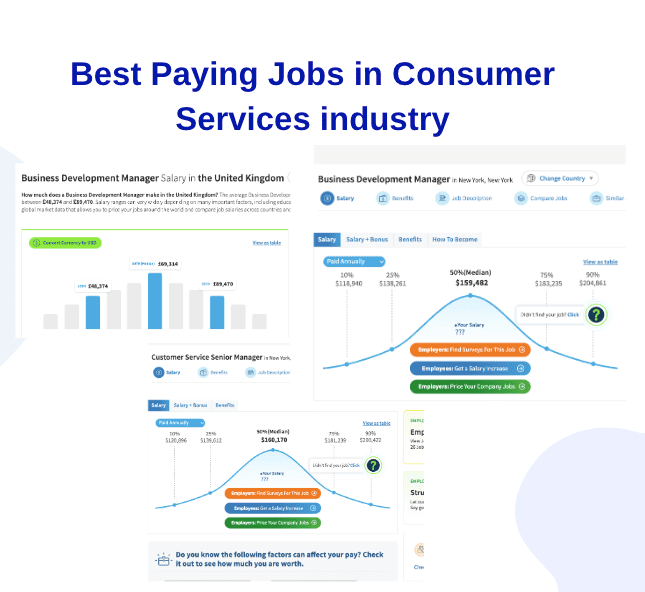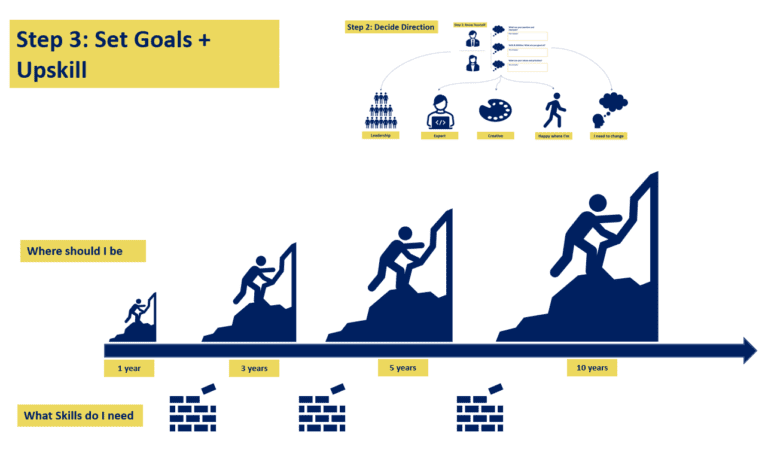Business Analyst Career Path – Everything You Need To Know in 2023

A business analyst plays a crucial role in the modern business environment, bridging the gap between IT and business units to drive organizational success. They analyze data, identify trends, and develop strategies to optimize processes, reduce costs, and improve overall performance.
This blog post will provide a comprehensive guide to become a business analyst, career path of business analyst path, covering the necessary education, skills, certifications, job titles, and more to help you excel in this rewarding field.
Educational Background and Skills Required
Business analyst’s educational qualifications
Bachelor’s degree programs: A business analyst typically holds a bachelor’s degree in fields such as business administration, finance, computer science, or a related discipline. These programs provide a solid foundation in business principles, analytical methods, and technical concepts necessary for a successful career in business analysis.
Master’s degree programs: Some business analysts may choose to pursue a master’s degree to advance their careers, such as an MBA, Master of Science in Business Analytics, or a Master of Science in Information Systems. These programs offer specialized knowledge and skills that can help business analysts tackle more complex projects and assume leadership roles.
Relevant skills
- Analytical skills: Business analysts must be adept at evaluating data, identifying trends, and drawing meaningful insights to inform decision-making processes.
- Technical skills: Proficiency in programming languages, databases, and data visualization tools is crucial for a business analyst to manipulate and interpret data effectively.
- Communication skills: Business analysts need to communicate complex ideas to both technical and non-technical stakeholders, making strong written and verbal communication skills essential.
- Problem-solving skills: The ability to identify problems, analyze potential solutions, and implement effective strategies is a key competency for a successful business analyst.
- Industry knowledge: Familiarity with the specific industry and its unique challenges enables business analysts to provide tailored solutions and recommendations.
Certifications and Professional Development
The value of certifications
Certifications can enhance your credibility in the business analyst position, showcase your expertise, and increase your career prospects. They demonstrate your commitment to continuous learning and staying current with industry best practices.
Entry-level certifications
- ECBA (Entry Certificate in Business Analysis): Offered by the International Institute of Business Analysis (IIBA), the ECBA is designed for individuals new to the business analysis field. It requires no prior experience and covers fundamental concepts and techniques.
- CCBA (Certification of Capability in Business Analysis): Also offered by IIBA, the CCBA targets professionals with 2-3 years of experience. It focuses on intermediate-level skills and knowledge, validating your ability to perform effective business analysis.
Advanced certifications
- CBAP (Certified Business Analysis Professional): IIBA’s CBAP is geared toward seasoned business analysts with at least five years of experience. It demonstrates advanced proficiency in business analysis principles and practices.
- PMI-PBA (Professional in Business Analysis): Offered by the Project Management Institute (PMI), this certification is for business analysts involved in project and program management. It highlights your ability to work effectively in a project-based environment.
Continuous learning and professional development
Embrace lifelong learning by attending workshops, webinars, and conferences to keep your skills up-to-date and expand your professional network.
Business analyst career paths and Job Titles

Let us briefly cover the business analyst career progression over experience levels.
Entry-level positions
Junior business analyst As an entry-level role suitable for recent graduates or professionals with limited experience in business analysis, junior business analysts work under the guidance of more experienced colleagues. They assist in data collection, documentation, basic analysis, and gain exposure to various aspects of the business operations and processes.
This role provides the foundation for further career growth and offers opportunities to learn best practices and methodologies from experienced business analysts.
Business analyst intern
Internships are a valuable avenue for gaining hands-on experience in the field while also building a professional network. As a business analyst intern, you will collaborate with management analysts or team members on real projects, developing your skills and understanding of the profession.
Internships may lead to full-time roles and help you stand out when applying for jobs in the future.
Mid-level positions
Business analyst
After gaining a few years of experience, you can progress to a full-fledged business analyst role. In this position, you will assume more responsibilities, working independently to gather requirements, analyze data, identify trends, and provide actionable insights to stakeholders.
Business analysts collaborate with cross-functional teams and play an essential role in driving organizational change and improvement.
Business systems analyst
Focusing on the technical aspects of business analysis, business systems analysts work to optimize IT systems and processes to meet business objectives. They evaluate the organization’s current technology infrastructure, identify gaps and inefficiencies, and propose solutions that align with the company’s strategic goals.
This role requires strong technical knowledge and the ability to translate business requirements into effective technology solutions.
IT business analyst
IT business analysts operate at the intersection of business and technology, ensuring that IT projects and systems align with the organization’s strategic goals and requirements. They gather and document requirements, create functional specifications, and collaborate with developers and other stakeholders to deliver IT solutions that meet business needs. This role demands an understanding of both business processes and IT systems.
Senior-level positions
Senior business analyst
With extensive experience in the field, senior business analysts take on leadership roles, managing complex projects, mentoring junior team members, and contributing to strategic decision-making. They leverage their expertise to tackle high-priority initiatives, drive process improvements, and influence key stakeholders to implement best practices. Senior business analysts may also participate in developing the organization’s long-term business analysis strategy.
Lead business analyst
As a lead business analyst, you will manage a team of business analysts, overseeing projects, and ensuring that your team’s work aligns with the organization’s objectives. This role involves coordinating efforts across multiple projects, providing guidance and mentorship to team members, and collaborating with other departments to drive change and achieve desired results. Effective communication and leadership skills are crucial for success in this role.
Business analysis manager
In this business analyst manager role, you will be responsible for the overall performance and success of the business analysis function within your organization. Your responsibilities include developing strategies, setting priorities, managing resources, and establishing performance metrics to track the team’s progress.
Business analysis managers collaborate with other leaders to align the business analysis function with the organization’s broader goals and ensure the team consistently delivers value to the organization.
Specialized roles and niches
Data analyst: As a data analyst, you specialize in processing and interpreting large volumes of data to identify trends, patterns, and insights that inform business decisions. This role requires proficiency in data analysis tools, programming languages, and statistical methods.
Financial analyst: Financial analysts focus on the financial aspects of an organization, evaluating its financial health, forecasting future performance, and making recommendations for improvement. They analyze financial data, create financial models, and provide insights to inform strategic planning and decision-making.
Industry-specific business analyst: Some business analysts choose to specialize in a particular industry, such as healthcare, manufacturing, or retail, to leverage their domain-specific knowledge and expertise. Industry-specific business analysts work to address unique challenges and opportunities within their chosen sector. They are well-versed in industry-specific regulations, trends, and best practices, which enables them to provide tailored solutions to meet the organization’s needs.
Supply chain analyst: Supply chain analysts help organizations streamline their supply chain operations by identifying inefficiencies and implementing improvements. They analyze data related to inventory management, logistics, procurement, and distribution to optimize processes, reduce costs, and enhance customer satisfaction.
Transitioning into Management Positions

As you gain experience and expertise in the business analysis field, you may wish to move into management positions. Some options include the below,
Project Manager
As a project manager, you will be responsible for leading teams to deliver projects on time, within scope, and within budget. You will plan, execute, and close projects, ensuring that objectives are met and stakeholder expectations are managed.
This role requires strong leadership, communication, and organizational skills, along with an understanding of project management methodologies and tools.
Product Manager
In this role, you will oversee the development and lifecycle of products or services within your organization. You will work closely with cross-functional teams, including business analysts, developers, and marketing, to ensure products meet customer needs and align with the company’s strategic objectives.
Product managers are responsible for setting the product vision, defining requirements, and monitoring performance against goals.
Operations Manager
Operations managers are responsible for the efficient functioning of an organization’s day-to-day activities. They oversee processes, manage resources, and ensure that operations align with strategic goals. In this role, you will work with business analysts and other stakeholders to identify process improvements, implement change initiatives, and manage risks.
Business Process Manager
In this role, you will focus on improving and optimizing the organization’s business processes. You will analyze current processes, identify areas for improvement, and implement changes to enhance efficiency and effectiveness.
Business process managers collaborate with business analysts and other stakeholders to develop process improvement strategies, monitor progress, and measure the impact of process changes.
Business Intelligence Manager
As a business intelligence manager, you will be responsible for the development and implementation of data-driven strategies to support decision-making and drive business growth. This role involves overseeing the collection, analysis, and interpretation of data, as well as the development of reports and dashboards for stakeholders.
Business intelligence managers work closely with data analysts, business analysts, and other team members to ensure data-driven insights are effectively communicated and acted upon.
Consulting Manager
If you have experience in business analysis and enjoy solving diverse business challenges, you may consider a role as a consulting manager. In this position, you will lead a team of consultants to help clients identify problems, develop solutions, and implement strategies for growth and improvement.
Consulting managers leverage their business analysis expertise and industry knowledge to provide valuable insights and recommendations to clients across various sectors.
Job market & salary levels
Salary Levels for Business Analysts in the US

Salaries for business analysts in the United States (& globally) can vary significantly depending on factors such as experience, education, certifications, geographic location, and industry. Here is a general overview of the salary ranges for different levels of business analyst roles (specific to US):
- Entry-level positions:
- Junior business analyst: The average salary for a junior business analyst in the United States ranges from $45,000 to $65,000 per year.
- Business analyst intern: Interns typically receive an hourly wage, which can range from $15 to $25 per hour, depending on the organization and location.
- Mid-level positions:
- Business analyst: The average salary for a business analyst in the United States ranges from $65,000 to $85,000 per year, with some professionals earning over $100,000 based on their experience, skills, and the organization they work for.
- Business systems analyst and IT business analyst: Salaries for these specialized roles generally fall within the same range as a business analyst, but may be slightly higher depending on the technical expertise required.
- Senior-level positions:
- Senior business analyst: The average salary for a senior business analyst in the United States ranges from $85,000 to $120,000 per year, with more experienced professionals earning even higher salaries.
- Lead business analyst: Salaries for lead business analysts can range from $90,000 to $130,000 per year, depending on factors such as team size, project complexity, and the organization’s size and industry.
- Management positions:
- Business analysis manager: The average salary for a business analysis manager in the United States ranges from $100,000 to $150,000 per year, with some professionals earning significantly more based on their experience, skills, and the organization they work for.
- Other management positions, such as project managers, product managers, and operations managers, typically have salary ranges that overlap with those of business analysis managers.
Keep in mind that these figures are only estimates and can vary depending on various factors. To get a more accurate understanding of the salary you can expect in a specific role, research salaries in your geographic area and industry, and consider factors such as your education, certifications, and relevant experience.
Job market outlook and demand
The demand for business analysts is expected to remain strong, driven by the increasing reliance on data-driven decision-making and the need for organizations to optimize their operations in a competitive business environment.
Networking and Community
Professional organizations and associations
- IIBA (International Institute of Business Analysis): IIBA is a leading professional association for business analysts, offering resources, certifications, and networking opportunities.
- PMI (Project Management Institute): PMI is a global organization for project management professionals, which also caters to business analysts through its PMI-PBA certification and related resources.
Networking events and conferences Attend industry
Networking events and conferences Attending industry events and conferences allows you to connect with other professionals, learn about the latest trends and best practices, and gain insights from thought leaders in the field. Some notable events include the IIBA Business Analysis Conference, the Project Management Institute Global Conference, and the Data & Analytics Summit.
Online communities and forum
Engage with your peers and stay informed by joining online communities and forums dedicated to business analysis, such as LinkedIn groups, Reddit’s r/businessanalysis subreddit, and the Modern Analyst forum. These platforms enable you to ask questions, share your knowledge, and discover valuable resources.
Tips for Success and Growth in the Business Analyst Career

Building a strong portfolio
A well-crafted portfolio showcases your skills, experience, and accomplishments, making it an essential tool for advancing your career. Include examples of your work, such as project deliverables, case studies, and testimonials from colleagues or clients.
Expanding industry knowledge
Stay informed about your industry by reading trade publications, attending webinars, and participating in industry events. This knowledge will enable you to provide more effective solutions and recommendations tailored to your organization’s specific needs.
Embracing new technologies and tools
The business analysis field is continually evolving, with new tools and technologies emerging to support data-driven decision-making. Stay ahead of the curve by learning about these advancements and incorporating them into your work.
Developing soft skills
While technical and analytical skills are essential for a business analyst, soft skills like communication, leadership, and emotional intelligence are equally important for career growth. Focus on honing these skills to enhance your ability to work effectively with diverse teams and manage challenging situations.
Continuous learning and professional development
Invest in your professional growth through ongoing education, certifications, and training. As the business analysis field evolves, staying current with best practices and emerging trends will help you remain competitive and advance your career.
Conclusion
The business analyst career path offers a wealth of opportunities for personal and professional growth. By focusing on your education, acquiring relevant certifications, and continuously developing your skills, you can pave your way to success in this dynamic field.
As a business analyst, you have the potential to drive meaningful change within organizations and contribute to their ongoing success. All the very best!
Here are some helpful job interview related blogs
- Tackling the final interview round
- How to answer ‘tell me about yourself’
- What are your career aspirations?
- Why do you want this job?
- Strengths and Weaknesses In Interview
- Interview questions for managers
- Interview questions for freshers
- Tips to succeed in a job interview
- Do you need an Career coach / Interview coach?
Here’s some helpful career related blogs
- Careers– Agile Coach, RTE, Product Owner, Scrum Master, QA Manager
- Project Management
- Managing Managers
- IT Career switch
- Software Engineering career path
- Agility, Agile Testing
Other Productivity / Tools posts that may interest you
- Productivity
- Book summary apps – Headway App vs Blinkist vs getAbstract
- AI Writers: / Blogging – Jasper, Writesonic, Article Forge , Copy AI, Anyword, Writecream, Copymatic, Quillbot, Peppertype, Jasper AI (pricing) &
- Work From Home tools: Jabra
Author also writes at his Medium site.





